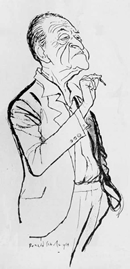 The first two chapters of Somerset Maugham’s Cakes and Ale are so bitchily insightful about the hypocrisies of literary culture that, if you’re a writer, your loved ones might want to hide out somewhere else while you’re reading it, lest you follow them around the house, cackling over and orating your favorite parts.
The first two chapters of Somerset Maugham’s Cakes and Ale are so bitchily insightful about the hypocrisies of literary culture that, if you’re a writer, your loved ones might want to hide out somewhere else while you’re reading it, lest you follow them around the house, cackling over and orating your favorite parts.
Scandal erupted in bookish London when the novel appeared in 1930. It was believed to include flimsily veiled portraits of Hugh Walpole and Thomas Hardy. Maugham denied the charge in a letter to Walpole, claiming, “I certainly never intended Alroy Kear to be a portrait of you. He is made up of a dozen people.” After the fellow writer’s death, though, he admitted that Walpole was the model.
The story opens as the narrator, a novelist, arrives home to discover that a far more famous author — one whose career was set into motion with a modicum of talent and a great deal of transparent yet somehow decorous striving — has left an urgent message for him. To his landlady’s disappointment, our hero declines to return the call right away. Instead he lies in bed speculating about the possible reasons for it.
It might be that an admirer of his had pestered him to introduce me to her or that an American editor, in London for a few days, had desired Roy to put me in touch with him; but I could not do my old friend the injustice of supposing him to be so barren of devices as not to be able to cope with such a situation. Besides, he told me to choose my own day, so it could hardly be that he wished me to meet anyone else.
Than Roy no one could show a more genuine cordiality to a fellow novelist whose name was on everybody’s lips, but no one could more genially turn a cold shoulder on him when idleness, failure, or someone else’s success had cast a shade on his notoriety. The writer has his ups and downs, and I was but too conscious that at the moment I was not in the public eye…
I had watched with admiration his rise in the world of letters. His career might well have served as a model for any young man entering upon the pursuit of literature. I could think of no one among my contemporaries who had achieved so considerable a position on so little talent. This, like the wise man’s daily does of Bemax, might have gone into a heaped-up tablespoon. He was perfectly aware of it, and it must have seemed to him sometimes little short of a miracle that he had been able with it to compose already some thirty books. I cannot but think that he saw the white light of revelation when he first read that Thomas Carlyle in an after-dinner speech had stated that genius was an infinite capacity for taking pains. He pondered the saying. If that was all, he must have told himself, he could be a genius like the rest; and when the excited reviewer of a lady’s paper, writing a notice of one of his works, used the word (and of late the critics have been doing it with agreeable frequency) he must have sighed with the satisfaction of one who after long hours of toil has completed a cross-word puzzle. No one who for years had observed his indefatigable industry could deny that at all events he deserved to be a genius.
All of Maugham’s fiction bears some relation to his experience. Not long ago I came across a fascinating audio recording of remarks he made on the subject at seventy.
In one way and another I have used in my writings pretty well everything that has happened to me in the course of my life. Sometimes an experience of my own has provided me with an idea, and I’ve just had to invent the incidents to illustrate it, but more often I’ve taken people whom I’ve known, either slightly or intimately, and used them as a foundation for the characters of my own invention. To tell you the truth, fact and fiction are so intermingled in my work that now, looking back, I can hardly distinguish one from the other.
Image taken from a site devoted to Maugham’s “ten best novels of the world.”